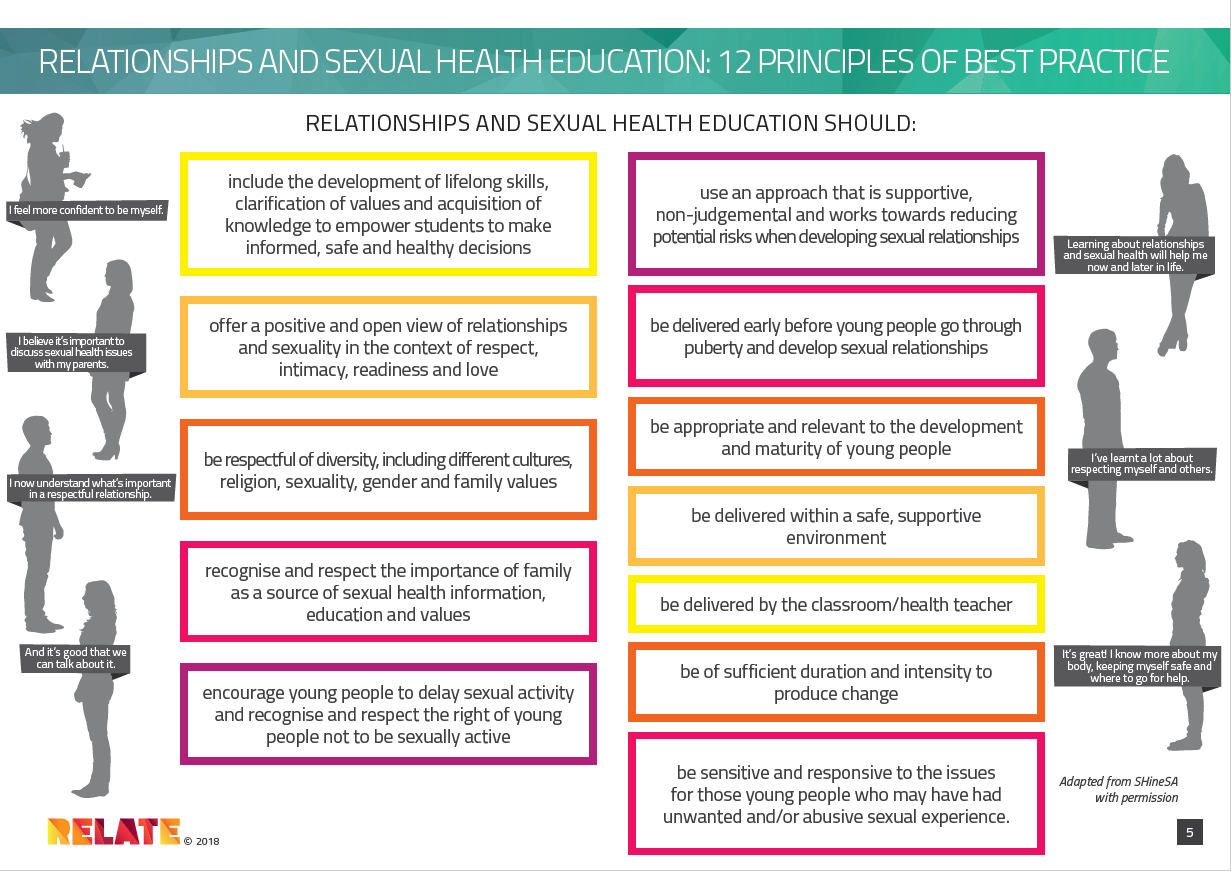Guiding Principles
Guiding principles
A number of formally recognised and endorsed State, National and International reports and policies underpin the foundation of this teacher support resource giving authority to the creation of a curricula that values and enables sexual health and relationships education in schools.
Growing and Developing Healthy Relationships (GDHR) is part of a suite of strategies spearheaded by the Western Australian Department of Health to work towards young people being provided with comprehensive and relevant health education for contemporary social needs.
Australia is signatory to a number of relevant international resolutions proposed by the World Health Organization, United Nations and UNESCO on the quality of health for all. These commitments are encoded in Federal Health and Education policy further reinforcing the content of this website.
The guiding principles that underpin the creation of this website are that:
-
In order to achieve empowerment through education we endorse the need for a whole-school, programmatic approach to sexuality education beginning in foundational years and following longitudinally through to lower secondary.1-4
-
Globally, young people between the ages of 15 and 24 constitute a high risk for STIs, HIV and other blood-borne viruses.5,6
-
Teachers have accurate, reliable and contemporary information in order to prepare for teaching.3
-
Resources are readily available and accessible to teachers.3
-
There is an acknowledgement and accommodation for sexual and gender diversity within sexual health and relationships education and reflected in the classroom and in the school.7
-
Education and health are inextricably presenting schools with an opportunity to reinforce and maintain positive health behaviours.8
-
Sexual health education is an essential component of the broader health promotion ethos of empowering people to increase control over, and improve, their own health.9,10
-
Sexual health is fundamental to the physical and emotional health and wellbeing of individuals, couples and families.11
-
Sexual health encompasses the rights of all persons to have the knowledge and opportunity to pursue a safe and pleasurable sexual life.11
The above form an overarching call-to-action to:
-
prioritise education as an effective means for affecting change in behaviour.
-
recognise the utmost importance of effective sexual health and relationships education.
-
minimise the transmission of STIs, HIV and other BBVs by encouraging the adoption of safe sex and safe drug-related behaviour.
-
minimise personal and social impact of STIs, HIV and other BBVs upon individuals, their families and the community.
-
minimise the incidence of unplanned, unwanted pregnancy.
12 principles of best practice
The following 12 principles of best practice for school-based RSE were adapted with permission from SHineSA for the RELATE: Respectful Relationships Program. See RELATE 2 for more information. 
References
- Australian Curriculum, Assessment and Reporting Authority. Curriculum. ACARA, no date. http://acara.edu.au/curriculum
- Western Australian Department of Health. Guiding Principles for the Provision and Practice of Sexual Health Education. Perth, 2003.
- Smith, Anthony, Marisa Schlichthorst, Anne Mitchell, Jenny Walsh, Anthony Lyons, Pam Blackman and Marian Pitts. Sexuality Education in Australian Secondary Schools 2010. (Monograph Series No. 80), Melbourne: Australian Research Centre in Sex, Health and Society, La Trobe University, 2011.
- Fisher, C. M., Waling, A., Kerr, L., Bellamy, R., Ezer, P., Mikolajczak, G., Brown, G., Carman, M. & Lucke, J. 2019. 6th National Survey of Australian Secondary Students and Sexual Health 2018, (ARCSHS Monograph Series No. 113), Bundoora: Australian Research Centre in Sex, Health & Society, La Trobe University.
- UNAIDS. Political Declaration on HIV and AIDS. UNAIDS; 2011. http://www.unaids.org/en/aboutunaids/unitednationsdeclarationsandgoals/2011highlevelmeetingonaids
- Department of Health. Western Australian Sexually Transmissible Infections Strategy 2019-2023. Western Australia, 2019.
- Equal Opportunity Commission WA. Guidelines for Supporting Sexual and Gender Diversity in Schools. Perth, 2013.
- Gillies, Sophia, Suzanne Dimitrijevich and Michelle Lambert. What is a Health Promoting School? Perth: WA Health Promoting Schools Association, 2011. "http://wahpsa.org.au/wp-content/uploads/2015/09/What-is-a-HPS-2011.pdf
- World Health Organization. The Ottawa Charter for Health Promotion. Geneva: WHO, 1986. http://who.int/healthpromotion/conferences/previous/ottawa/en/index.html
- World Health Organization. Jakarta Declaration on Leading Health Promotion into the 21st Century. Geneva: WHO, 1997. http://www.who.int/healthpromotion/conferences/previous/jakarta/declaration/en/index1.html
- World Health Organization. Developing Sexual Health Programmes: A Framework for Action. Geneva: WHO, 2010. http://www.who.int/reproductivehealth/publications/sexual_health/rhr_hrp_10_22/en/
- United Nations Educational, Scientific and Cultural Organization. (UNESCO) International technical guidance on sexuality education: an evidence-informed approach France, 2018. https://www.unaids.org/sites/default/files/media_asset/ITGSE_en.pdf